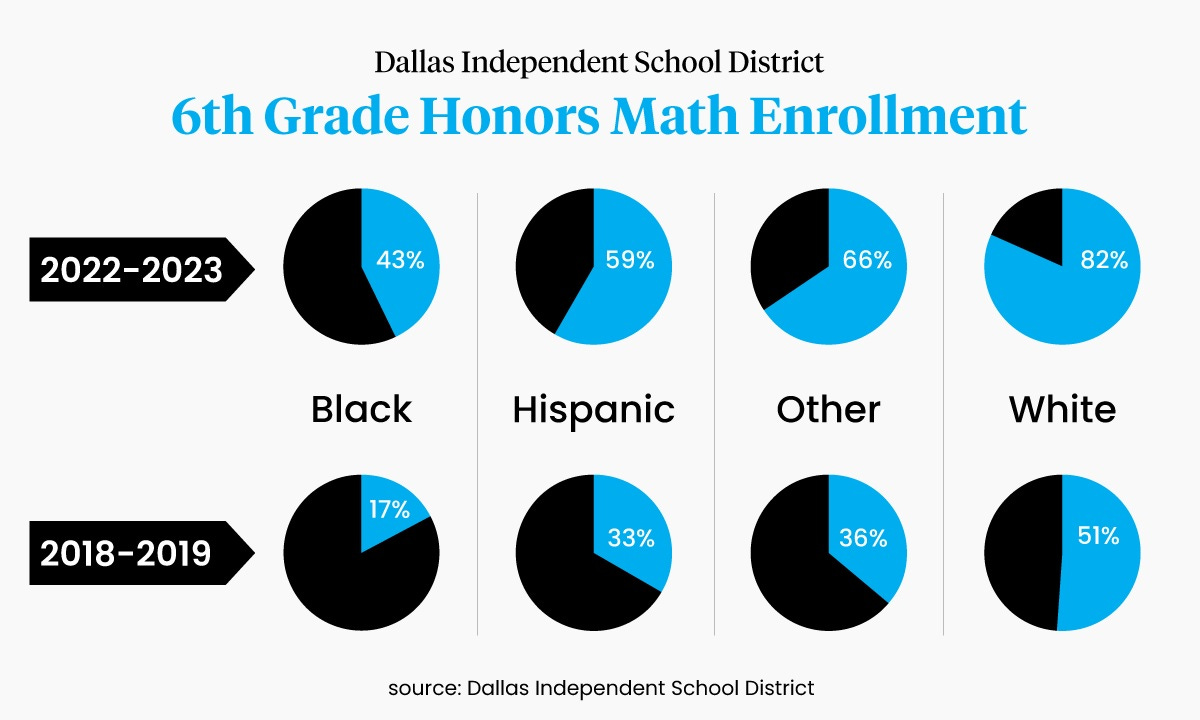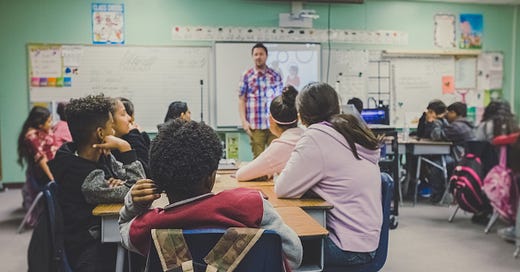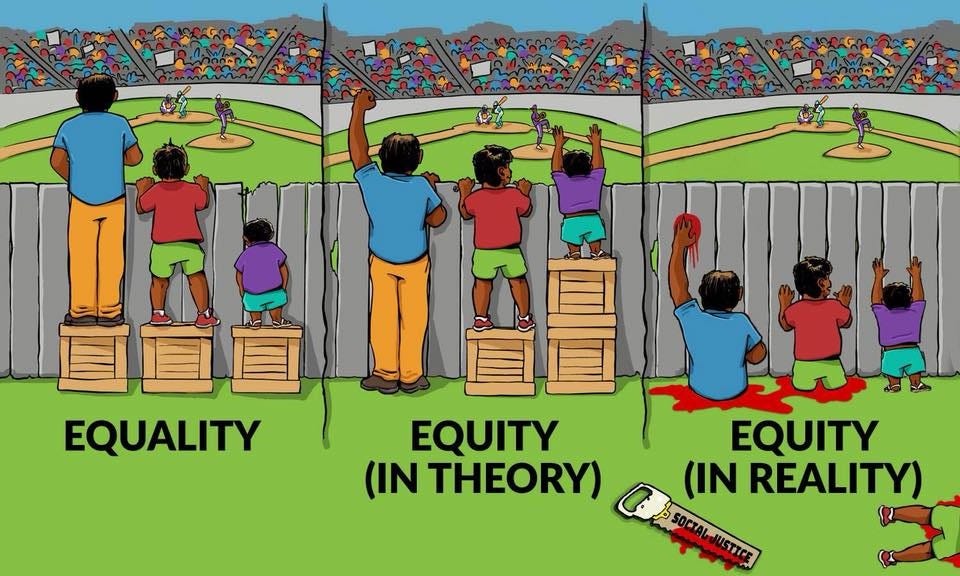“The result of the educative process is capacity for further education.” — John Dewey
A couple of weeks ago, Armand Domalewski wrote a guest post for Noahpinion about how the new California Math Framework threatened to dumb down math education in the state — for example, by forbidding kids from taking algebra before high school:
Well, I’m going to write another post about this subject, because the direction in which math education is trending in America under “progressive” guidance just frustrates me so deeply.
A few days after Armand’s post, the new California Math Framework was adopted. Some of the worst provisions had been thankfully watered down, but the basic strategy of trying to delay the teaching of subjects like algebra remained. It’s a sign that the so-called “progressive” approach to math education championed by people like Stanford’s Jo Boaler has not yet engendered a critical mass of pushback.
And meanwhile, the idea that teaching kids less math will create “equity” has spread far beyond the Golden State. The city of Cambridge, Massachusetts recently removed algebra and all advanced math from its junior high schools, on similar “equity” grounds.
It is difficult to find words to describe how bad this idea is without descending into abject rudeness. The idea that offering children fewer educational resources through the public school system will help the poor kids catch up with rich ones, or help the Black kids catch up with the White and Asian ones, is unsupported by any available evidence of which I am aware. More fundamentally, though, it runs counter to the whole reason that public schools exist in the first place.
The idea behind universal public education is that all children — or almost all, making allowance for those with severe learning disabilities — are fundamentally educable. It is the idea that there is some set of subjects — reading, writing, basic mathematics, etc. — that essentially all children can learn, if sufficient resources are invested in teaching them.
Before public education — one of the key crusades of the original Progressive movement — only private actors invested resources in educating children. Families taught their kids skills, rich families hired tutors, companies trained their workers, churches provided some classes, etc. But it was a threadbare, uneven patchwork. Worse, it was highly unequal — if you weren’t born to a family with lots of time and/or money to spare, you didn’t get nearly as much education. This led to inequality throughout society, as well as the preservation of intergenerational wealth. Furthermore, it wasted much of society’s productive potential, because the unlucky kids weren’t learning as many useful skills as they could have been.
Universal public education was a way to attack all of these problems at once. By investing state resources in childhood education, it not only boosted human capital and economic growth, it eroded inequality of birth and circumstance. Teachers, hired by the state, provided some of what poor kids’ families couldn’t provide. Everyone except for a very few fringe ideologues now agrees that this model was a success; public education is pretty much universally believed to be a key input into economic development, and plenty of research supports that notion that it fosters intergenerational mobility as well. It is not a perfect equalizer and never will be, but it is one of the more important equalizers that exist in our society.
When you ban or discourage the teaching of a subject like algebra in junior high schools, what you are doing is withdrawing state resources from public education. There is a thing you could be teaching kids how to do, but instead you are refusing to teach it. In what way is refusing to use state resources to teach children an important skill “progressive”? How would this further the goal of equity?
I can easily see one (very twisted) perspective that might lead someone to think it would do so. If you take a strongly “hereditarian” view toward education, then you believe that inborn mental ability — what we typically call “IQ” — determines most of what people can and can’t learn. If you are a strong hereditarian, then perhaps you believe that students who don’t learn algebra well are simply born without the cognitive ability to learn it.
And if you believe that, then you might conclude that the only way to create equity in society would be to handicap the kids who were born with the ability to learn algebra. Like the Handicapper General in Kurt Vonnegut’s satirical sci-fi short story “Harrison Bergeron”, you might try to kneecap the opportunities of the kids you believed to be the genetic elite. In doing so, you would then become a living, breathing embodiment of this meme that opponents of equity created in order to ridicule the whole idea:
Now, if you went up and asked “progressive” educators like Jo Boaler if they believed in a version of hereditarianism so strong as to make Charles Murray himself blush, they would undoubtedly deny that they do. And I’m sure they don’t consciously think that math ability is all in the genes. But when you think about the idea of creating equity by restricting access to advanced math classes, it’s pretty much impossible to avoid the conclusion that the idea is to make all kids equal by making them equally unable to learn.
But whatever you think about the morality of this idea, it simply will not work. The reason is that the strong hereditarian hypothesis is wrong; practically all kids are educable, with the proper investment of resources.
I know this from personal experience. I was a math tutor for many years, in high school and college, and part of that was volunteer work tutoring poor Black and Hispanic kids. Guess what? They learned a lot of math! But this isn’t just my own anecdote; evidence consistently shows that tutoring is highly effective. Nickow, Oreopoulos, and Quan (2020) surveyed 96 studies using a variety of different tutoring approaches in a variety of different contexts. Here’s a summary of what they found:
We found that tutoring is remarkably effective at helping students learn, with over 80% of the 96 included studies reporting statistically significant effects. Averaging results across the studies included in this analysis, we found a pooled effect size of 0.37 standard deviations. In other words, with the help of tutoring, a student at the 50th percentile would improve to the 66th percentile. In the field of K-12 education research where there is little agreement on what works, these findings are remarkable not only for their magnitude but also for their consistency. The evidence is clear that tutoring can reliably help students catch up.
The effectiveness of tutoring can help us understand achievement gaps in math classes. Some students do well because of greater preparation — they show up already knowing much of the material, or having the general concepts in place to pick it up quickly. This is because they had a tutor at home growing up: their parents, who had the leisure time and educational background required to teach their kids some math. A few rich parents also hire private tutors, but the main tutors are almost always Mom and Dad.
Now imagine what will happen if we ban kids from learning algebra in public junior high schools. The kids who have the most family resources — the rich kids, the kids with educated parents, etc. — will be able to use those resources to compensate for the retreat of the state. Either their parents will teach them algebra at home, or hire tutors, or even withdraw them to private schools. Meanwhile, the kids without family resources will be out of luck; since the state was the only actor who could have taught them algebra in junior high, there’s now simply no one to teach them. The rich kids will learn algebra and the poor kids will not.
That will not be an equitable outcome.
Taken to its logical extreme, the idea of restricting what can be taught in public schools — for whatever reason — leads us back to the pre-public-school era. It leads us to a world of private schools and home schooling. That’s not an era we should seek to return to. Nor am I being hyperbolic; Cambridge’s restriction of junior high algebra is effectively a small step toward that bygone era, since kids with resources will just learn algebra from their parents or be pulled out into private schools.
So what should we do instead? Dallas came up with an answer: Teach kids more math instead of teaching them less. In 2019, Dallas Independent School District implemented a new equity policy that encouraged many more people to take honors math classes:
Many capable Hispanic, Black and English learner students did not elect to join these classes on their own or were passed over by their instructors. And their parents were often unaware they could make the request.
Dallas ISD, which serves some 142,000 children, took note of the disparity and in 2017 formed a racial equity advisory council — some of whose members had children in the district — with the goal of improving opportunity for all…It decided to move from an opt-in model to an opt-out policy in the 2019-20 school year. Since then…students cannot opt out [of advances classes] without written parent permission. The move has dramatically increased participation among traditionally marginalized children.
The results were pretty incredible. First of all, many more students enrolled in honors math:

Before the change, three times as many White students as Black students enrolled in honors math; after the change, it was less than twice as many. Not perfect equity, but progress in that direction.
But did all these new students actually learn the honors math? Yes, indeed they did:
And the policy has not led to a decrease in student scores as some speculated: Last year’s 8th-grade Algebra I students had similar pass rates as those in years prior, the district said, with 95% of Hispanic students passing the test and 76% meeting grade-level proficiency; 91% of Black students passing and 65% meeting grade level and 95% of English learner students passing the state exam and 74% meeting grade level.
Guess what? Children are educable. If you invest the resources of the state in poor kids and underrepresented minorities, they will learn. The true path toward equity is to have the state teach more, not less. Instead of trying to prevent the well-prepared kids from learning algebra, invest more in teaching algebra to the disadvantaged kids!
How did we end up in a world where “progressive” places like California and Cambridge, Massachusetts believe in teaching children less math via the public school system, while a city in Texas believes in and invests in its disadvantaged kids? What combination of performativity, laziness, and tacit disbelief in human potential made the degradation of public education a “progressive” cause célèbre? I cannot answer this question; all I know is that the “teach less math” approach will work against the cause of equity, while also weakening the human capital of the American workforce in the process.
We created public schools for a reason, and that reason still makes sense. Teach the kids math. They can learn.







Good write-up. There are no words in Elvish, Entish or the tongues of men that can accurately describe how resoundingly stupid, counterproductive and non-progressive this proposal truly is.
I am morbidly curious though. Does anyone know what these (presumably less burdened) teaching resources will now be put towards instead of the algebra classes?
I took algebra in fucking 6 grade, calculus in 10th, and ended up getting degrees in math.
The reason I was ahead at math was because my older brother made me do his homework. so when I was in 5th grade I was doing his 8th grade alegebra homework. So in 6th grade I Was ready for algebra.
I mean, not everyone is going to have an 8th grade bully making them do their algebra. But even a fucking 5th grader can learn algebra.
Why is the progressive policy to just throw up your hands and give up?
Homeless people everywhere? Well, we just give up, let them setup camps outside.
Kids can't read? Give up, lower educational standards.
Everyone is obese? Give up, body positivity and "healthy at any size"
if I wracked my brain I could come up with 10 more of these